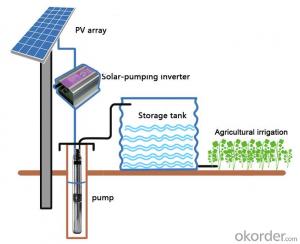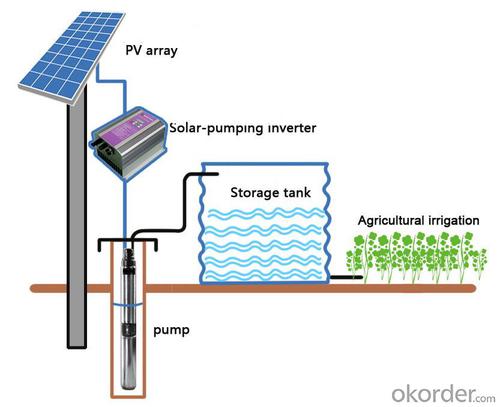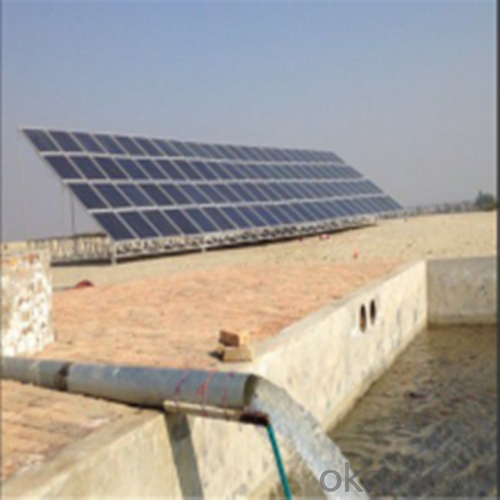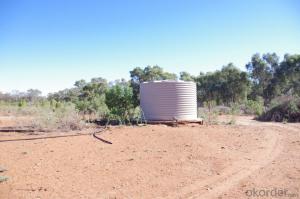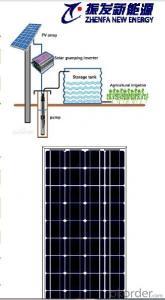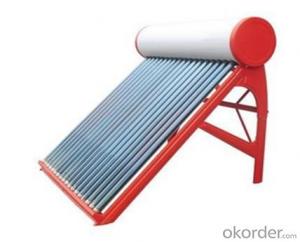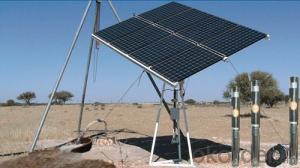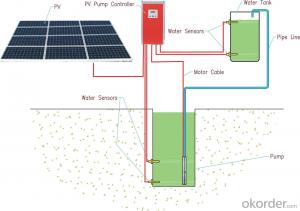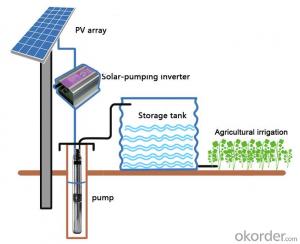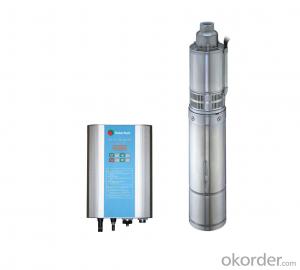Solar Panel Water Pumps with Solar Power Pumps and Battery Backup
- Loading Port:
- Shanghai
- Payment Terms:
- TT OR LC
- Min Order Qty:
- 1 set
- Supply Capability:
- 1000 set/month
OKorder Service Pledge
OKorder Financial Service
You Might Also Like
Solar Water Pump
DC solar water pumping system consists of the motor, pump, controller, solar array and some other accessories, such as water level sensor, float switch, etc. Considered that storing water is more efficient than storing electricity, the system is designed to directly drive the pump without battery which can reduce the construction and operating cost and routine maintenance effectively.The PV array consists of multiple solar panels connected in series/parallel, which can supply the whole system as power source by converting the absorbed solar radiation energy to the electrical energy. The pump driven by a brushless DC permanent magnet motor draws water from deep-well or river. The pumped water is then fed into reservoir or water tank, or connected to the irrigation system or fountain system directly.
Advanced Technology
Applications Innovation
The efficiency of DC brushless permanent magnet motor has been increased up to 25% in comparison with traditional asynchronous motor.
Technology Innovation
Stator and rotor are sealed by environment friendly casting resin.Motor insulation resistance can be hold higher than 300MΩfor more than 10 years, which consumedly increased the security and reliability of the submersible motor.
Structure Innovation
Casting resign technology processed stator and rotor as well as the water lubricated bearing make the submersible pump environment friendly.
Feature
High Efficiency & High Reliability
DC Brushless Permanent Magnet Motor
Minimum Maintenance, long Service Life
Environment Friendly Materials, Lubricated Without Oil
Application
Village or Family Water Supply
Animal Drinking Water & Livestock Watering
Garden/Courtyard Irrigation
Swimming Pool
Water Supply for Bivouac or Camping Car
Water Supply for Remote Area
Automatic Control
Operate Automatically, No Need Watching
Maximum Power Point Tracking (MPPT)
Dry-run Protection
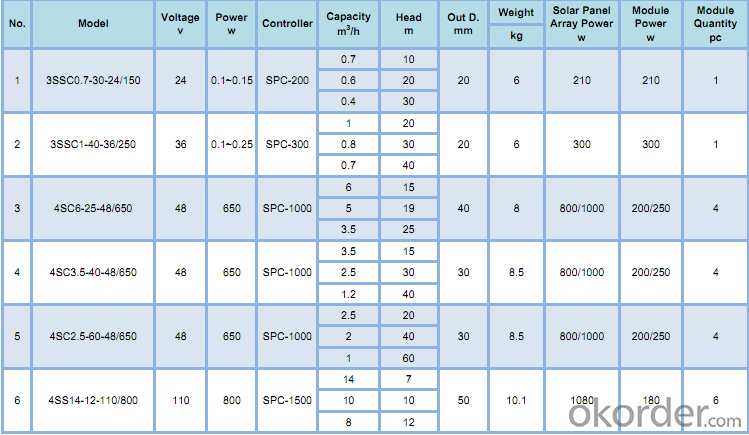
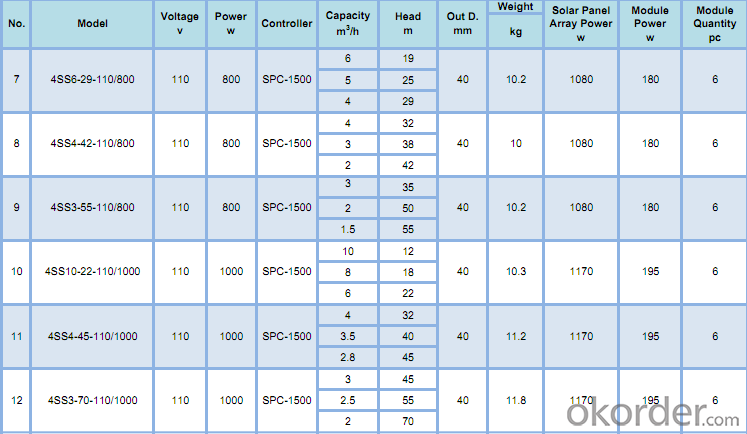
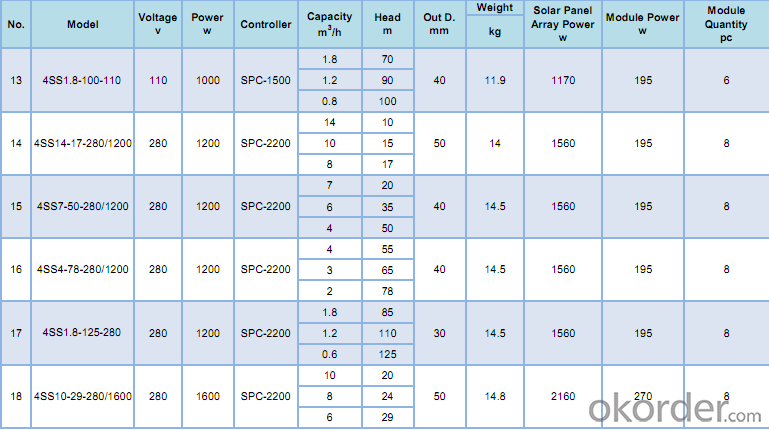
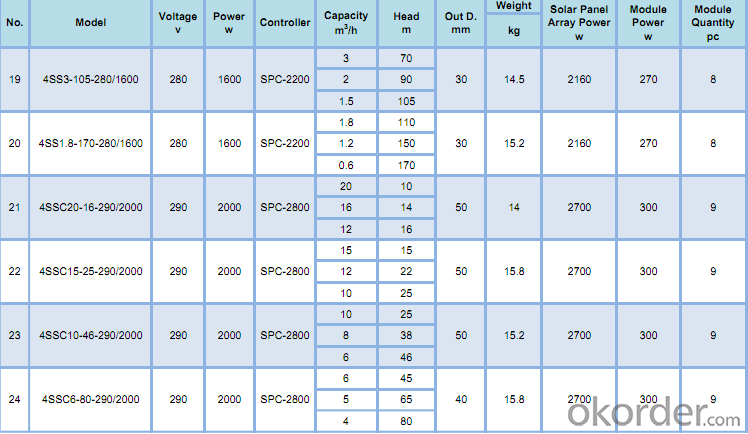
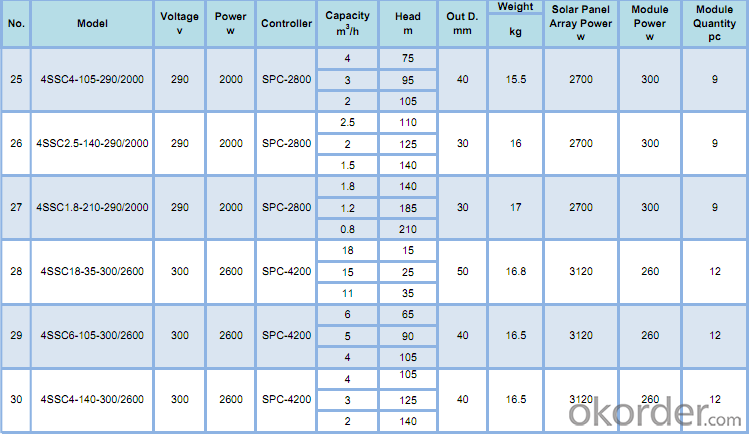
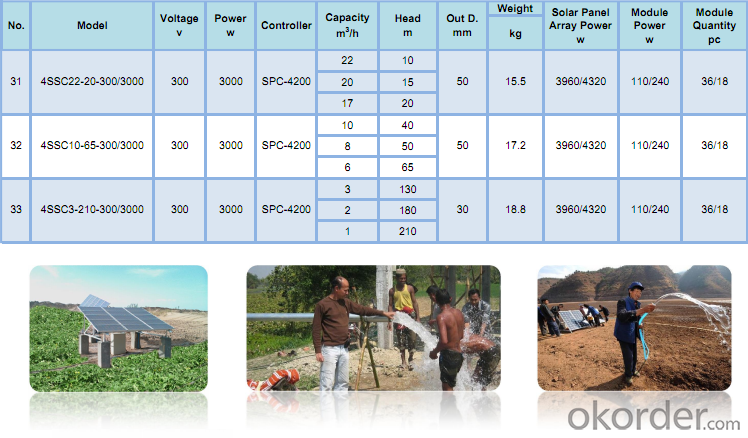
- Q: What is the expected energy savings from using a solar pump?
- The expected energy savings from using a solar pump can vary depending on factors such as the size of the pump, the amount of sunlight available, and the specific application. However, solar pumps are generally designed to significantly reduce or eliminate the need for conventional electricity, resulting in substantial energy savings.
- Q: How noisy is a solar pump?
- A solar pump typically operates quietly, producing minimal noise during its operation. The noise level of a solar pump can be compared to a low hum or a soft whirring sound, which is barely noticeable in most cases. The absence of noisy components like combustion engines or mechanical parts in solar pumps contributes to their quiet operation. Overall, the noise generated by a solar pump is generally considered to be very low and does not cause any significant disturbances or disruptions.
- Q: Can solar pumps be used for livestock watering?
- Yes, solar pumps can be used for livestock watering. Solar-powered pumps offer a sustainable and efficient solution for providing water to livestock in remote areas or off-grid locations. These pumps utilize solar energy to power the pumping mechanism, eliminating the need for electricity or fuel. They are cost-effective, environmentally friendly, and can provide a reliable water source for livestock, ensuring their hydration and overall well-being.
- Q: How do I protect a solar pump system from pests or animals?
- There are several effective ways to protect a solar pump system from pests or animals. Firstly, you can install a fence or barrier around the system to prevent access. Additionally, consider placing mesh or wire screens over any openings or vents to prevent animals from entering. Regularly inspect and maintain the system, ensuring that all components are securely sealed and any potential entry points are blocked. Lastly, using natural pest deterrents such as repellent sprays or ultrasonic devices can help to keep pests away from the system.
- Q: Can a solar pump be used in remote locations?
- Yes, a solar pump can be used in remote locations. Solar pumps are designed to operate using solar energy, eliminating the need for a power grid connection. This makes them perfect for remote areas where access to electricity is limited or non-existent. The solar panels can be installed in almost any location that receives adequate sunlight, enabling the pump to function efficiently even in remote and off-grid locations.
- Q: How does a solar pump handle sediment in the water?
- A solar pump typically uses a filter or strainer to prevent sediment from entering the system. This helps to protect the pump and other components from damage and ensures the water remains clean and free from debris.
- Q: What is the cost of a solar pump?
- The price of a solar pump can differ depending on various factors such as the brand, capacity, and features it possesses. On an average basis, a basic solar pump for small-scale uses can range from $500 to $2,000. These pumps are commonly utilized for irrigation purposes in gardens or small farms. For larger-scale agricultural or commercial uses, the price can vary from $2,000 to $10,000 or more, depending on the pump's size and capacity. These pumps are specifically engineered to manage larger volumes of water and may incorporate additional features like remote monitoring or advanced control systems. Additionally, the cost may also encompass other components like solar panels, batteries, and installation fees. It is crucial to carefully consider the overall system requirements and seek advice from a reputable supplier or installer to obtain an accurate estimation of the total expense. It is noteworthy that even though the initial cost of a solar pump may be higher in comparison to traditional pumps, the long-term advantages, such as reduced energy expenses and environmental sustainability, render it a valuable investment in the long run.
- Q: Can a solar pump be used for hydroponic systems?
- Yes, a solar pump can be used for hydroponic systems. Solar pumps are energy-efficient and can be powered by solar panels, making them an environmentally friendly option for hydroponics. They can provide the necessary circulation and oxygenation required for hydroponic nutrient solutions, ensuring proper growth and development of plants.
- Q: Can a solar pump be used in areas with high wind conditions?
- Yes, a solar pump can be used in areas with high wind conditions. The solar pump operates on solar energy, not wind, so it can function effectively irrespective of the wind conditions in the area. The only requirement for the solar pump is access to sunlight to generate the necessary electricity to power the pump.
- Q: How much sunlight does a solar pump require to operate?
- A solar pump requires an adequate amount of sunlight to operate effectively. The exact amount of sunlight needed can vary depending on factors such as the size and efficiency of the solar pump, as well as the specific application it is being used for. However, generally, a solar pump requires a minimum of 4-5 hours of direct sunlight per day to function optimally.
Send your message to us
Solar Panel Water Pumps with Solar Power Pumps and Battery Backup
- Loading Port:
- Shanghai
- Payment Terms:
- TT OR LC
- Min Order Qty:
- 1 set
- Supply Capability:
- 1000 set/month
OKorder Service Pledge
OKorder Financial Service
Similar products
Hot products
Hot Searches
Related keywords
